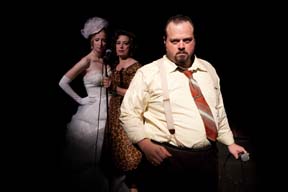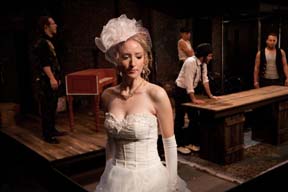
Dorothy Chansky
Three Pennies in 2010 Dollars?
Review of "The Threepenny Opera"
Arden Theatre Company
40 N. 2nd Street
Philadelphia, PA 19106
September 30-November 7, 2010
www.ardentheatre.org
by Dorothy Chansky
 |
| Victoria Frings, Mary Martello, and Scott Greer. Photo by Mark Garvin |
When Brecht and Weill's "Threepenny Opera" first arrived on the New York stage in 1934, it was the newest thing in Marxist modernist theatre. It opened to negative reviews and closed after just twelve performances. Three quarters of a century later, as an ur-grandfather of now commonplace techniques, "Threepenny" can easily register as nostalgia and readily contains the seeds of kitsch.
Philadelphia's Arden Theatre does not so much avoid these possibilities as it does acknowledge them, shrug, and move forward with a loose postmodernist sensibility. (This means it knows that the past is past but not quite totally alien nor really recoverable.) Director Terrence J. Nolan deploys familiar Brechtian elements such as projections and curtains on runners almost with a wink and a nod. Scaffolding, collaged eras of costuming, and interracial casting--all present--are today's default production settings, so there's nothing inherently distancing or even particularly attention-grabbing about them in and of themselves. The challenge is to put bite as well as bark into "Threepenny"--a challenge that Nolan and company approach with a balance of skill and helplessness.
The "Threepenny" material is as old as the 1728 "Beggar's Opera," John Gay's London satire featuring interpolated popular songs to comment on the resemblance between honor among thieves and decency among the putatively respectable. This was the source material for a 1920s British adaptation that was quickly translated into German. Brecht was taken by the script; he added some of his own poems and enlisted composer Kurt Weill to put an edgy and modern spin on an epic portrait of crime and big business as co-dependent bedfellows.
In "Threepenny," robber/murderer MacHeath weds Polly Peachum, only daughter of a man who turns panhandling into a corporate empire by forcing all beggars to work assigned street corners as his employees. Peachum's ability to organize large scale civic unrest gives him leverage with the police. Polly's absconding with her own virginity represents a major loss of capital assets. The world will continue to go round as long as no one upsets the rotten apple cart and the show runs on the ironies behind the threat of just such an upset.
 |
| Victoria Frings and (back l-r) Sebastian Naskaris, Doug Hara, Sean Lally, and Jamal Lee Harris. Photo by Mark Garvin |
Program notes suggest connections with "The Sopranos" and other sagas that domesticate organized crime. The Arden production puts its own cynical stamp on political activism and middle class guilt (both of which it unsubtly suggests are forms of false consciousness) by flashing such slogans as "It's the economy, stupid" cheek by jowl with "Who lends to the poor lends to the lord." The platitudinous pastiche comes together in the toothsome (and toothless) "Bad things happen to good people. Make a difference."
Nolan's own pastiche includes Jeremy Sams's newish British translation of the song lyrics (including such quickly aged bon mots as "life's a bitch and then you die"), and an older, decidedly British translation of the script by Scotsman Robert MacDonald. The cast speaks American English. All of this actually works nicely to keep a certain distance between audience and sentiment. These characters are larger than life but less than real. Scott Greer's Peachum is world-weary but not tired of the chase. Mary Martello's Mrs. Peachum is boozy, blowzy, and nobody's fool. Rachel Wallace's Jenny – the prostitute who loves and then betrays MacHeath – is a package of sultry singing and louche legginess gone rancid with a vengeance. Anthony Lawton makes Tiger Brown, the chief of police, a sort of Dudley Doright who weeps crocodile tears at the fate of his oldest friend, who is also public enemy number one (MacHeath). Victoria Frings is a vocally lovely ice princess of a Polly. Tall, pale, and blonde, she seems to be almost sleepwalking in her early scenes, only coming to life when her beloved Mackie is hauled off to jail and she takes over the business as if she were born to keep a criminal's books. Which Polly sort of was. Liz Filios's Lucy Brown, daughter of the police chief and in bed with MacHeath, is an overripe school girl who sings like an ingénue and schemes like jailbait. Only Terence Archie as MacHeath is merely lifesized, although the same buffed body that made him an irresistible Chad Deity in last season's The Elaborate Entrance of Chad Deity still turns heads. His voice doesn't quite live up here.
 |
| Photo by Mark Garvin |
The production's visual realm works like MacHeath and Polly's wedding party. Everything is attractive, belongs on a good checklist, and looks borrowed. Set designer Tom Gleeson's scaffolds and platforms facilitate movement and the tiny platform center stage focuses us on the ridiculously tiny jail cell standing in for an impotent criminal justice system. Thom Weaver's lighting evokes the seamy, the ordinary, and the nightclub as appropriate.
The didacticism that presumably shocked in Brecht's day now serves as expected homily. "The rich may be able to cause poverty," we learn, "but they can't bear to look at it." The unexpected happy denouement in which MacHeath is cut down from the gallows so as not to deprive the audience of its good time is just another familiar moment in the alienation lexicon. The final word, delivered in a rhymed couplet, is effective for about the amount of time it takes to deliver it:
Although it's turned out happy in the end, not all the poor
receive a pardon.
You can see them when you leave the Arden.
Well, sort of. Mostly the destitute were off the streets, or at least off the street where this theatre is located, by the time the curtain came down. It's no longer hard to revive the much-heralded Brecht. Less easy is finding a way to generate the seeing with new eyes and shock of recognition he aimed for. Nolen and company worked hard at a polished revival with some witticisms and contemporary references. For better or for worse, the sting was pre-empted.
| museums | NYTW mail | recordings | coupons | publications | classified |
